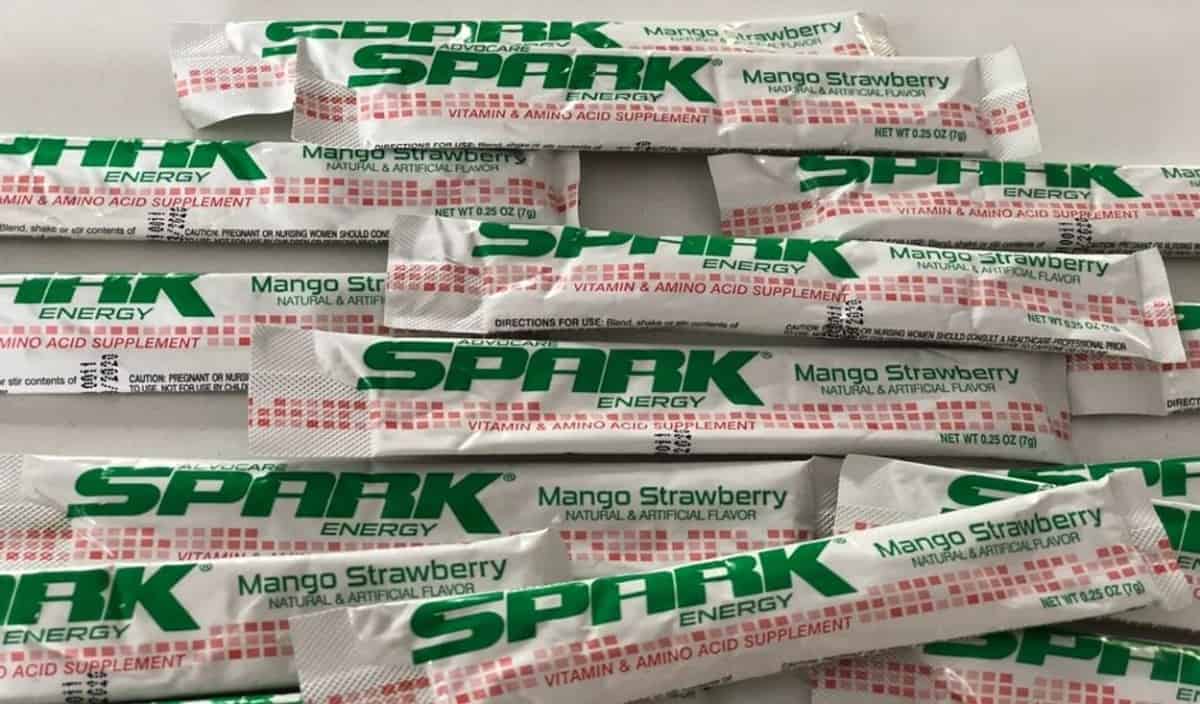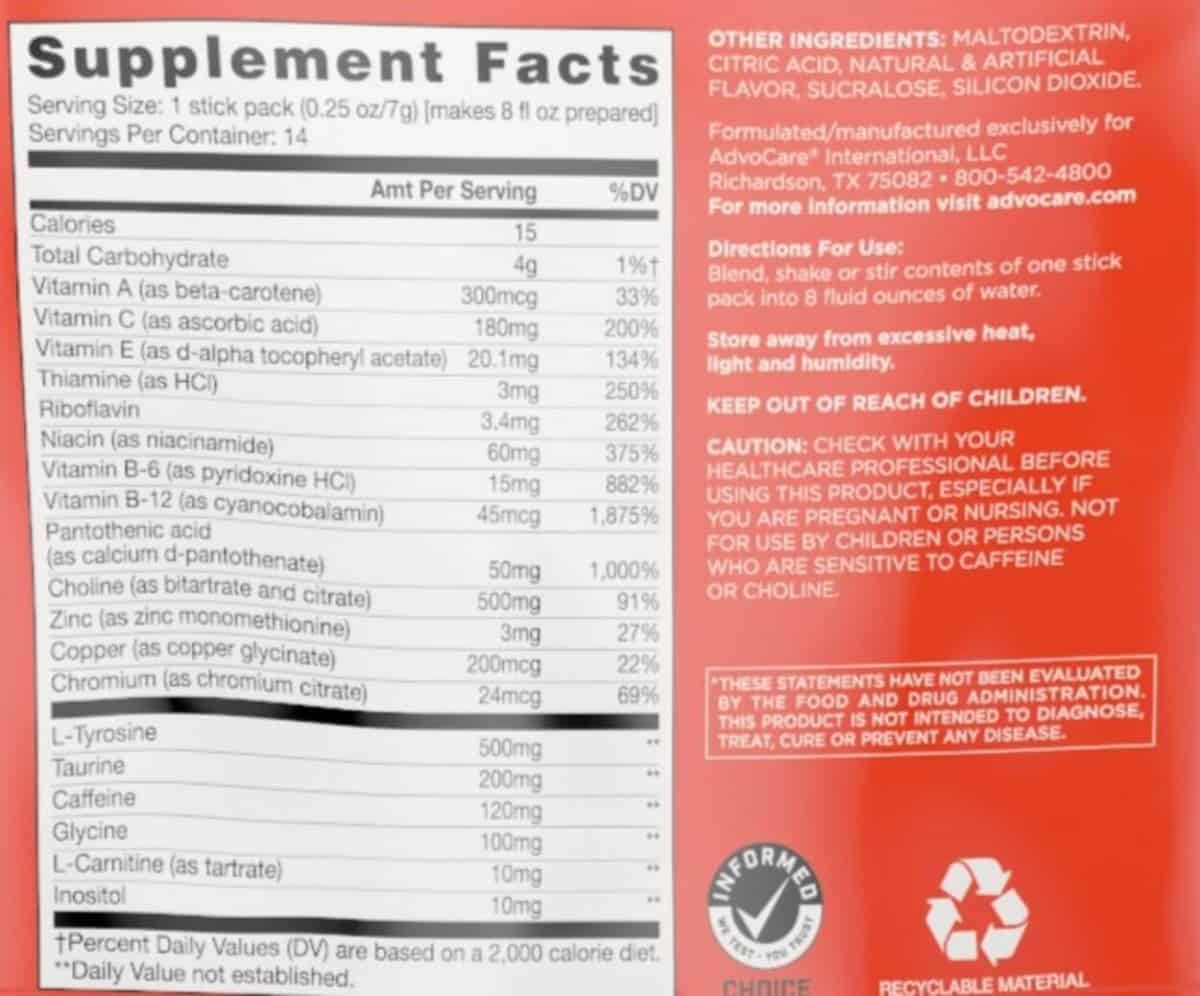
Advocare Spark, a sugar-free energy drink that claims to be high in minerals and vitamins, is a costly product. A busy lifestyle demands energy to get through the hectic workload.
Advocare Spark powdered energy drink provides mental focus, hydration, and on-the-go nourishment.
Advocare Spark energy drink contains 15 calories, 4g of total carbohydrate, 120g of caffeine, and different essential vitamins, minerals, and amino acids.
If you wish to know more about the nutrient values of the Advocare Spark energy drink mix, please keep reading.
Nutrition Facts of Advocare Spark Energy Drink
The nutrition facts of Advocare Spark energy drink are given below.
| Nutrients | Amount Per Serving | % Daily Value |
| Calories | 15 | |
| Total Carbohydrate | 4g | 1% |
| Vitamin A | 300mcg | 33% |
| Vitamin C | 180mg | 200% |
| Vitamin E | 20.1mg | 134% |
| Thiamin | 3mg | 250% |
| Riboflavin | 3.4mg | 262% |
| Niacin | 60mg | 375% |
| Vitamin B6 | 15mg | 882% |
| Vitamin B12 | 45mcg | 1875% |
| Pantothenic acid | 50mg | 1000% |
| Choline | 500mg | 91% |
| Zinc | 3mg | 27% |
| Copper | 200mcg | 22% |
| Chromium | 24mcg | 69% |
| L-Tyrosine | 500mg | |
| Taurine | 200mg | |
| Caffeine | 120mg | |
| Glycine | 100mg | |
| L-Carnitine | 10mg | |
| Inositol | 10mg |

So, what nutrients are in a sachet of Advocare Spark powdered energy drink?
Calories
Advocare Spark energy drink mix contains 15 calories per serving.
A calorie is an energy unit represented as the amount of heat compelled to raise the temperature of water by one degree.
Advocare Spark energy drink contains only 15 calories which are very low compared to the amount we daily need. That means you can easily have one or two servings of Advocare Spark energy drink mix without changing your daily routine.
Two major definitions of calories are widely used for historical reasons. The measure of heat required to raise the warmth of one gram of water by one degree Celsius is known as a tiny calorie or gram calorie (commonly abbreviated as cal).
The heat required to induce the same rise in one kilogram of water is measured in the big calorie, food calorie, or kilocalorie (Cal, Calorie, or kcal), most commonly employed in nutrition.
As a result, the kilocalories or kilojoules, that we see on food labels are actually kilocalories we find in the United States of America. According to the Department of Agriculture, one medium-sized apple has 95 calories. However, it really has 95 kilocalories.
The US’s desirable daily calorie intake value is around 2,500 calories for men and 2,000 calories for women. Since Advocare Spark only contains 15 calories, you may need to consume other food and beverages to meet your calorie needs.
Total Carbohydrate
Advocare Spark energy drink powder contains 4g of total carbohydrates.

Carbohydrates are a type of macronutrient that may be found in a variety of refreshments. The majority of carbs are found in plant-based meals like grains. Carbohydrates are also found in fermented foods in the form of starch or added sugar by food producers.
Green plants form carbohydrates from carbon dioxide and water during the process of photosynthesis.
Carbohydrates are crucial structural components of organisms as well as energy sources. Furthermore, carbohydrates are a component of the structure of nucleic acids, which contain genetic information.
Vitamins in Advocare Spark Energy Drink
Advocare Spark energy drink contains vitamin B complex along with vitamins A, C, and E.
Vitamin A
Vitamin A is a group of fat-soluble retinoids assigned to immune capacity, vision, reproduction, and cellular communication.
Vitamin A is important for perception because it is a component of rhodopsin, a protein that absorbs light in the retinal receptors, and it helps the conjunctival membranes and cornea differentiate and operate properly.
Vitamin A is also necessary for cell development and differentiation and the correct creation and maintenance of the heart, lungs, and kidneys, among other organs.
Preformed vitamin A (retinol and its esterified form, retinyl ester) and provitamin A carotenoids are present in the human diet. Animal-based foods, such as dairy products, fish, and meat, contain vitamin A.
Vitamin C
Vitamin C, also known as L-ascorbic acid, is a water-soluble vitamin found naturally in fruits and vegetables such as oranges and other citrus fruits.
Vitamin C is necessary for the production of collagen, L-carnitine, and certain neurotransmitters, as well as for protein metabolism. Collagen is a protein that is found in connective tissue and plays an important function in wound healing.
Few studies have looked at whether vitamin C can help prevent or postpone the development of certain cancers, cardiovascular disease, and other illnesses caused by oxidative stress by reducing the harmful effects of free radicals through its antioxidant action.
Most people get plenty of vitamin C from a salutary diet.
Vitamin E
Vitamin E is an antioxidant that can help protect your cells from harm, and it can be found in a variety of foods.
Vitamin E may have a variety of roles in the body. Many biological roles, including a role as a fat-soluble antioxidant, have been proposed. Vitamin E serves as a radical scavenger in this function, providing a hydrogen (H) atom to free radicals.
Vitamin E regulates enzyme activity and impacts gene expression, such as in protein kinase C (PKC), which plays a role in smooth muscle growth. Vitamin E helps to deactivate PKC and therefore limit smooth muscle growth.
Thiamin
Thiamin is a B complex vitamin found in unprocessed grains, beans, and liver, whose deficiency causes beriberi. It’s a sulfur-containing thiazole and pyrimidine derivative. Vitamin B1 is another name for it.
Thiamin aids in the production of energy from food. Thiamin, also known as thiamine, is required for cell growth, development, and function.
The majority of people obtain adequate thiamin through their diet. Yeast, beans, pork, brown rice, and fortified foods like morning cereals are high in thiamin. Heating meals containing thiamin, on the other hand, can lower the amount of thiamin in them. Thiamin is also available as a supplement, which is usually taken orally.
Riboflavin
Riboflavin Vitamin B2, commonly known as riboflavin, is a food-based vitamin that may also be taken as a nutritional supplement.
The body needs riboflavin for cellular respiration. Eggs, green vegetables, milk and other dairy products, meat, mushrooms, and almonds are good protein sources.
Riboflavin is used to reduce the risk of developing riboflavin deficiency. Riboflavin can be used for a variety of other things that aren’t covered in this prescription guide.
However, if you have gallbladder disease, or cirrhosis, or other liver diseases, you might need to seek advice from your health provider before taking any food containing riboflavin.
Niacin
Niacin, commonly known as nicotinic acid, is an organic molecule, and vitamin B3 is inevitable for human health. Plants and animals may produce it from the amino acid tryptophan.
Niacin is a B vitamin that your body generates and uses to convert food into energy. It supports the health of your neurological system, digestive system, and skin.
Although niacin is frequently included in daily multivitamins, most individuals obtain enough niacin through their diet. Yeast, milk, pork, tortillas, and cereal grains are all high in niacin.
Niacin is used as a nutritional supplement to treat pellagra, a condition characterized by a lack of niacin. Skin and mouth sores, anemia, headaches, and exhaustion are all syndromes of pellagra.
Pantothenic Acid
Pantothenic acid, generally known as vitamin B5, is a water-soluble B vitamin required for good health.
Animals require pantothenic acid to produce coenzyme A (CoA), which is required for fatty acid metabolism, as well as to synthesize and metabolize proteins, carbs, and lipids in general.
Pantothenic acid may be found in nearly all foods. Yeast and organ meats (liver, kidney, heart, and brain) are particularly high; nevertheless, eggs, milk, vegetables, legumes, and whole-grain cereals are probably more frequent sources.
Intestinal bacteria generate pantothenic acid, although the amount produced and its significance in human nutrition are unclear.
Vitamin B6
Vitamin B6 in coenzyme form serves a wide range of activities in the body and is very flexible since it participates in over 100 enzyme processes, most of which are related to protein metabolism.

Vitamin B6 is essential for cognitive development since it aids in the production of neurotransmitters and keeps blood homocysteine levels in check.
Vitamin B6 is generally found in the form of pyridoxine in dietary supplements. Vitamin B6 is found in most multivitamin-mineral supplements. There are other dietary supplements that include simply vitamin B6 or vitamin B6 combined with additional B vitamins.
Vitamin B12
Vitamin B12, commonly known as cobalamin, is a water-soluble vitamin that plays a role in metabolism and serves as a cofactor in DNA synthesis, as well as fatty acid and amino acid metabolism.
Vitamin B12 (cobalamin) is required for red blood cell development, cell metabolism, neuron function, and the synthesis of DNA, the genetic information-carrying molecules inside cells.
In the United States, vitamin B12 deficiency is uncommon. People who eat a vegetarian or vegan diet, on the other hand, maybe at risk of insufficiency since plant sources lack vitamin B12. Vitamin B12 deficiency is more common in older persons and people with digestive tract disorders that impair nutritional absorption.
What types of minerals are in Advocare Spark energy drink?
The minerals in Advocare Spark powdered energy drink minerals and their functions are listed in the table below.
| Nutrients | Function |
| Choline | Aids in the production and release of the neurotransmitter acetylcholine |
| Zinc | Helps form many enzymes and proteins and create new cells |
| Copper | Plays an important role in iron metabolism and the immune system |
| Chromium | Improves insulin action; aids in the maintenance of normal blood glucose levels |
Advocare Spark Energy Drink Ingredients
Advocare Spark energy drink mix contains different ingredients in its formula such as follows.
- Calories
- Caffeine
- Carbohydrates
- Vitamin A
- Vitamin C
- Vitamin E
- Thiamine
- Riboflavin
- Niacin
- Vitamin B6
- Vitamin B12
- Pantothenic acid
- Zinc
- Copper
- Chromium
- Choline
- L-Tyrosine
- Taurine
- Glycine
- L-Carnitine
- Inositol
- Maltodextrin
- Citric acid
- Natural flavor
- Artificial flavor
- Sucralose (Splenda)
- Silicon dioxide
Caffeine Content in Advocare Spark Energy Drink
Advocare Spark energy drink mix contains 120mg of caffeine per serving.

Caffeine is a methylxanthine alkaloid present in the nuts, seeds, and leaves of various East Asian and South American plants. It is structurally linked to adenosine and operates largely as an adenosine receptor antagonist with psychoactive and anti-inflammatory properties.
This represses adenosine-mediated central nervous system activity downregulation, therefore, extending the activity of the brain’s medullary, vagal, vasomotor, and respiratory centers.
This drug also activates the central nervous system by promoting neurotransmitter release. Caffeine’s anti-inflammatory properties are attributed to phosphodiesterases’ nonselective competitive inhibition (PDEs).
Caffeine doses of up to 400 milligrams per day appear to be safe for most healthy individuals. Four cups of brewed coffee, ten cans of cola, or two “energy shot” beverages have about the same amount of caffeine.
However, you should keep in mind that the caffeine level of beverages varies a lot, particularly in energy drinks.
Is there artificial sweetener in Advocare Spark energy drink mix?
If you’re attempting to cut back on sugar and calories in your diet, artificial sweeteners or other sugar replacements may be a good option.
Advocare Spark energy drink contains sucralose instead of sugar, so you can drink this beverage without any worry.
Sucralose
Sucralose is an artificial sweetener and sugar replacement that is noncaloric since most of it is not broken down by the body.
Sucralose comes in pulverized form, allowing for a volume-for-volume replacement with sugar. This granulated sucralose mixture contains fillers, all of which dissolve quickly in water. While pulverized sucralose resembles giving volume-for-volume sweetness, the texture of baked goods may change considerably.
Sucralose is not hygroscopic. Therefore baked goods produced with it will be significantly drier and less thick than those made with sucrose.
Also, it safe has been approved by the FDA to be safe to use in food and drinks.
Advocare Spark Energy Drink Price
You can purchase Advocare Spark energy drinks from their official website at $54.99 per canister (42 servings).
The same size of the tub is available for $60.80 on Amazon, including shipment. The equal tub is available at eBay for $61.45.
However, before purchasing anything online, you should always compare the price and delivery charge because they might vary from one online shop to another.
Advocare Spark Energy Drink Flavors
Advocare Spark powdered energy drink has the following delicious flavors you can try.
- Cherry
- Grape
- Mandarin orange
- Citrus
- Fruit punch
- Mango strawberry
- Pink lemonade
- Green apple
- Watermelon
- Blue raspberry
Here’s a review about Advocare Spark energy drink to help you understand and know more about it.
Conclusion
Advocare Spark energy drink contains 15 calories, zero added sugar, essential vitamins, and minerals to help you stay fit and energized. Advocare Spark powdered energy drink can provide you with power and awareness as long as you consume it moderately.
However, if you are with a child, pregnant, or suffering from any health issues, I suggest you consult your health provider before having any caffeinated energy drinks, including Advocare Spark energy drinks.
Other Article:
Can you drink Advocare Spark every day?
Click here if you want to view the visual version of the article.
